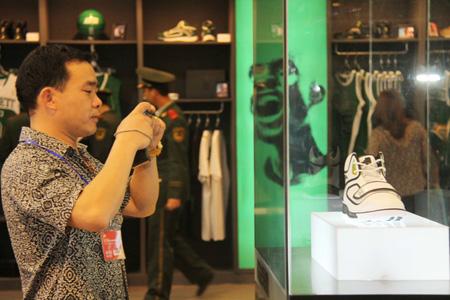
A client takes pictures of a sports shoe at an expo in Jinjiang city, Fujian province. Shoe manufacturers in the province are attempting to break into the market in Taiwan. [Photo / China Daily]
QUANZHOU - Shoe manufacturers in Quanzhou city, Fujian province are speeding up their pace of entry into the market in Taiwan.
According to the city's Inspection and Quarantine Bureau, shoes worth $1.52 million were exported to Taiwan in the first four months of 2011, 50.4 percent more than in the same period last year.
Quanzhou produces nearly one fifth of the world's sports shoes. It's also home to 11 out of 15 of China's most noted sports brands. In 2010, the city exported 605 million pairs of footwear to more than 80 countries worldwide, accounting for one tenth of the country's total volume of footwear exports.
Statistics show that since Taiwan opened its doors to mainland investment in 2009, more than $100 million has poured into the island, with 70 percent coming from Fujian province.
Enthusiasm was bolstered when an Economic Cooperation Framework Agreement between the mainland and Taiwan took effect in 2011, with shoe manufacturers forming the vanguard of companies hoping to crack the market.
Xtep International Holdings Ltd was the first to try when it opened a 90-square-meter franchised store in Hsimenting, one of Taipei's busiest shopping districts, in May 2010. One year on, and with three new stores, the company is confident of making a profit within three years.
"Xtep will continue to expand by 10 to 15 new stores every year, to eventually 300 stores in Taiwan," said Zhuang Chaohui, head of Xtep's overseas business division.
To date, Xtep products worth $111,500 have been exported to Taiwan. Although the sum is negligible compared with the company's annual global sales of 5 billion yuan ($769 million) in 2010, "it can be a springboard for Xtep to gain technology and management experience, as well as access to the Southeast Asia market", said He Ruibo, the company's chief financial officer.
Xtep is now looking to raise $100 million by issuing 250 million Taiwan Depository Receipts (TDR). The establishment of its first management team in Taiwan is also in progress.
"The TDR issue will be a practical advertisement," He said.
Xtep is not alone in attempting a push into the market; in 2010, another sports brand, Peak Sports Products Co, began sales to the island. It has since exported products worth $151,200, and is on schedule with a plan to open a franchised store on the island.
The Taiwan market is dominated by the likes of Adidas, Nike and Puma, yet lower-middle-class brands such as Xtep are very rare, said Ye Jianzhong, an analyst with BOCOM International Holdings. Ye considers lower- to mid-range sporting goods a niche market for mainland brands.
Early in 2006, one of China's leading sports brands, Anta Sports Products Limited, revealed a plan to open franchised stores in Taiwan, but that goal went unfulfilled after the island imposed a tariff of nearly 50 percent on some goods from the mainland.
Even with that hurdle eliminated, recognition of mainland brands is still low. "Adidas and Nike are still first choice for youths, because they spent so much on TV commercials and sponsorships for sports leagues. I don't see any mainland brands on these occasions," said Chen Chenlung, an office worker living in Taipei.
Unlike the mainland market, first-tier brands are much more affordable in terms of the local level of income.
On the mainland, a pair of Nike sport shoes sells at between $61 and $122, while Xtep sells for around half that price, at $30 to $46. However, in Taiwan the addition of taxes means Xtep's price rises to between $62 and $82, while the average price for Nike is around $100.
Faced with a not-so-competitive price advantage, Xtep stores in Taiwan have set up kids' playgrounds and game zones in an attempt to attract more customers.
"There are certain differences between Taiwan and the mainland shoe market; for example, people in Taiwan tend to have wider feet, which requires some adjustment in the design ," said Joe Huang, a Taiwan businessman in the shoe industry.
"Moreover, most companies entering the Taiwan market will look for an agent to better cope with local policies, thus the qualifications of the agent are vital as well," he said.





